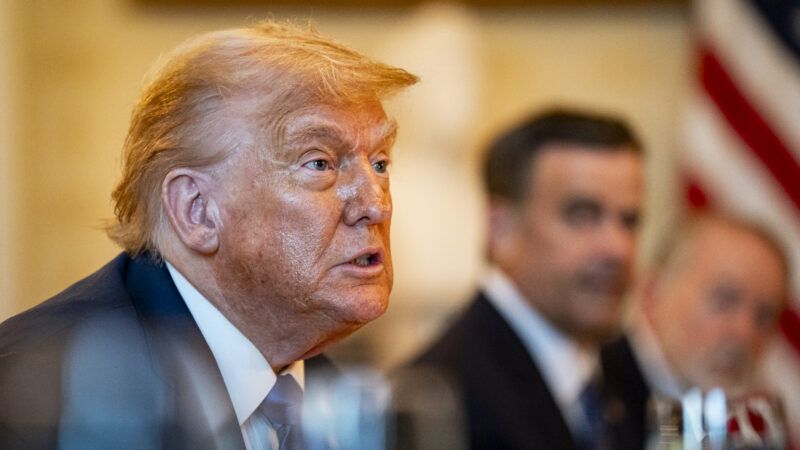The Trump Administration Says Its Speech-Based Deportation Policy 'Does Not Exist'
The government’s lawyers also say that supposedly nonexistent policy is perfectly consistent with the First Amendment.

In a case that went to trial in Boston this week, the Trump administration argues that its policy of arresting, detaining, and deporting international students for expressing anti-Israel opinions "does not exist." The government's lawyers also maintain that the supposedly nonexistent policy is perfectly consistent with the First Amendment—a less laughable argument that nevertheless is hard to reconcile with Supreme Court precedent, especially as applied by several lower courts.
President Donald Trump and his underlings, including Secretary of State Marco Rubio and Department of Homeland Security officials, have made it clear that they are determined to expel students, including legal permanent residents as well as visa holders, who have engaged in protests or other forms of advocacy that the government views as "pro-Hamas" or "anti-Semitic." Rubio says those activities, even when "otherwise lawful," justify removal from the United States because they threaten to undermine U.S. foreign policy interests.
The Trump administration claims it is targeting "aid or support" for "designated terrorist groups" and "unlawful anti-Semitic harassment and violence," neither of which is constitutionally protected. That defense is hard to take seriously, since the government avers that even writing an anti-Israel op-ed piece or peacefully participating in pro-Palestinian protests falls into those categories.
Two academic organizations, the American Association of University Professors and the Middle East Studies Association, are asking U.S. District Judge William Young for a preliminary injunction against the Trump administration's speech-chilling "ideological deportation policy." They say it amounts to blatant viewpoint discrimination, which is presumptively unconstitutional, and government retaliation for speech protected by the First Amendment.
To bolster that argument, the plaintiffs cite Bridges v. Wixon, a 1945 decision in which the Supreme Court held that "freedom of speech and of press is accorded aliens residing in this country." That case involved a longtime legal resident from Australia who was deemed deportable based on the allegation that he had been affiliated with the Communist Party.
"Once an alien lawfully enters and resides in this country, he becomes invested with the rights guaranteed by the Constitution to all people within our borders," Justice Frank Murphy wrote in a concurring opinion. "Such rights include those protected by the First and the Fifth Amendments and by the due process clause of the Fourteenth Amendment. None of these provisions acknowledges any distinction between citizens and resident aliens."
The government's lawyers say the plaintiffs are overreading that decision. Just seven years later in Harisiades v. Shaughnessy, they note, the Supreme Court rejected the First Amendment claims of immigrants who were threatened with deportation because they had been members of the Communist Party.
The latter decision, however, was based on a deferential First Amendment test that the justices later repudiated. Notably, that standard applied to all speakers, including U.S. citizens.
"The claim is that, in joining an organization advocating overthrow of government by force and violence, the alien has merely exercised freedoms of speech, press and assembly which [the First] Amendment guarantees to him," Justice Robert H. Jackson wrote for the majority in Harisiades. Not so, Jackson said, citing the Court's 1951 decision in Dennis v. United States, which upheld criminalization of membership in the Communist Party based on a "clear and present danger" exception to the First Amendment.
The Court renounced that test in the 1969 case Brandenburg v. Ohio, holding that even advocacy of criminal conduct is constitutionally protected unless it is both "directed" at inciting "imminent lawless action" and "likely" to do so. When you combine that ruling with the holding in Bridges v. Wixon, the First Amendment argument against the Trump administration's speech-based deportation initiative looks a lot stronger than the government suggests.
Since Brandenburg, the Supreme Court has not definitively resolved the question of whether the First Amendment applies in the context of deportation. But several federal appeals courts have said it does. If so, it is hard to see how the president's crusade against students whose views offend him can pass constitutional muster.
© Copyright 2025 by Creators Syndicate Inc.


Show Comments (111)